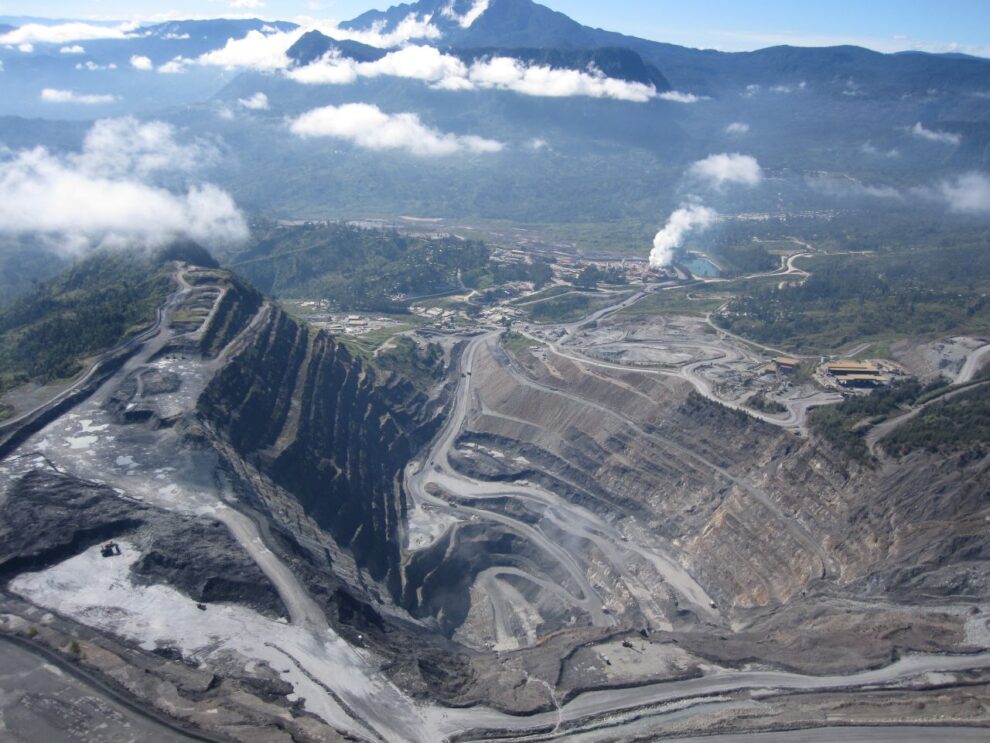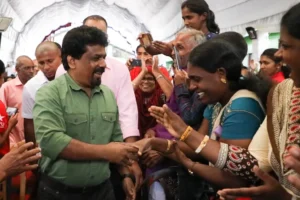- Three years after the Papua New Guinea government refused to renew its license, the Porgera gold mine is now on track to reopen.
- The mine will relaunch under joint ownership of the government and mine operator Barrick Gold.
- Activists in PNG have joined global protests against Barrick, saying the new agreement does not address a legacy of violence and environmental damage, and drawing parallels between Porgera and Barrick’s mines in Tanzania and Pakistan.
Activists from Papua New Guinea, where a controversial gold mine is inching toward reopening, have joined a campaign of global protests ahead of the annual general meeting of Canada-based Barrick Gold.
Barrick, the world’s second-largest gold mining company, plans to hold its annual general meeting on May 2, reporting “mutual prosperity” through partnerships with countries and communities where it works. People living near several of the company’s mines, however, took to the streets to protest what they describe as persistent environmental destruction and violence against locals.
Stanley Peter, an environmental scientist who has volunteered with human rights NGO Akali Tange Association, joined the protest in Papua New Guinea to demand a dialogue with Barrick.
In March, Barrick announced it would reopen the Porgera copper and gold mine. The mine had been closed since 2020, when PNG’s government refused to renew its license, citing “environmental damages claims and resettlement issues.”
Peter said Barrick has ignored demands that it take responsibility for violence and ongoing land and water contamination that has displaced people and contributed to ongoing and targeted attacks, home burnings, and even deaths.
“We are concerned that we will be overlooked, that they will not look at the issues that we are raising, and they will go ahead and get mining started, and we will be left as we are,” Peter said.
Barrick said it’s restarting the mine with a new vision: joint ownership with the government that will help ensure that the mine, expected to reopen this year, will benefit “all stakeholders.” The new model, chief executive Mark Bristow said in a release, represents “another victory” for a model being used in Tanzania and Pakistan.
But some in Porgera — and in Tanzania and Pakistan — say the model is not likely to bring the benefits it promises. They say government mining interests in politically turbulent regions have led to increased military action and muzzled activism.
In Porgera, victims of three decades of violence are still searching for justice.
“This is not right. Even though they know about the mine legacy issues, they are still going ahead to mine the Porgera gold, and we cannot tolerate that,” said Cressida Kuala, an Indigenous Ipili landowner, single mother and survivor of assault. Waste dumps, she said, have poisoned her land and rivers.
For more than a decade, Kuala has helped women who were sexually assaulted by mine workers to demand justice from Barrick, which has paid compensation to more than 100 women. But Kuala said this is not enough.
“We have been deprived of our rights as resource owners, and we need the company and the government to hear our voices to create a dialogue system, so that women can get remedy to sustain their lives, because we have lost our land, our integrity, our dignity,” she said.
There are few details about Barrick’s new agreement with the government, manifested in a joint venture called New Porgera, of which the government owns 51% and will receive 53% of the “economic benefits.” China-based Zijin Mining operates the mine with Barrick, and the government’s ownership is split between landowners and state-owned companies at the national and provincial level in landlocked Enga province. Barrick is expected to receive a new license before the end of this year.
A complicated relationship with the mine
When officials refused to renew the Porgera mine license to Barrick Nugini, the joint venture with Zijin, James Marape had recently become prime minister, promising to spread mining wealth to citizens. Since then, he has promoted the expansion of gas and mining projects, including the Wafi-Golpu copper-gold project and the methane gas Papua LNG project, both run by large foreign firms.
Refusing to renew the license helped the government negotiate for ownership of the mine. Opponents, however, say New Porgera was created without the involvement of the people most affected, whether by physical violence or pollution from waste on land and in waterways. Violence between clans and tribes was a threat when the mine was operating, and also after it closed.
“We have a lot of civil unrest in our society, and the government is just going ahead and signing contracts with the mine to get the Porgera gold. We don’t really know the reason behind that,” Kuala said. “Still we will be facing the same problems that we have faced for the past three decades.”
Peter said local communities have a complex relationship with the mine: when it shut, people lost their jobs and businesses, and there was less money changing hands in the region. The mine accounted for 10% of the country’s total exports at the time, and worsening poverty led to worsening violence between families and tribes. However, when it was running, people were murdered, and mine waste contaminated waters and made arable land barren.
“It is complicated. The mine is a significant part of the livelihoods of Porgera Valley,” Peter said. “It can solve poverty, and it can create poverty.”
Barrick says the “host-country partnership” under which it will operate in Papua New Guinea has been successful in Tanzania. The company has also set up a similar model in Pakistan for its Reko Diq project that aims to begin production in 2028.
Barrick began mining in Tanzania in the 1990s, and in 2019, it agreed to share its operations with the government, which holds 16% ownership. It owns two operating mines.
MiningWatch Canada coordinator Catherine Coumans said the North Mara mine in particular has long been plagued by reports of mine-related killings, sexual assaults and forced evictions that have left residents with broken limbs. She said the similarities to the Porgera mine were “striking,” and government involvement has not reduced the violence.
What changed, she said, was a reluctance to speak up about harms. After the government joined the mine, she heard from residents that they didn’t know where to go to raise concerns, because the mine was now seen as the president’s mine. In a report released in October 2022 based on interviews with officials, victims and their relatives, Coumans wrote that since the government’s involvement, the mine police have used sometimes brutal force in evicting residents.
In November, 21 Indigenous residents near the North Mara mine sued Barrick Gold in Canada over human rights violations. In December, the legal fight continued with a lawsuit against a London-based gold market association for certifying Barrick’s gold from North Mara as responsibly sourced.
Barrick Gold declined to be interviewed for this article. In previous statements, the company has said that it does not employ the security officers accused of violence against locals, and that it has established a grievance mechanism at the North Mara mine, which Coumans called “ineffective.” In response to the lawsuit over its responsible sourcing, Barrick suggested police officers were defending themselves against armed gold raiders. In correspondences to Coumans’s findings, it said Mining Watch failed to substantiate the allegations, and that there were no forced evictions since it took over, with land acquisition and compensation proceeding according to Tanzanian law.
When asked about the potential similarities with Tanzania, Peter said: “We haven’t seen [the New Porgera agreement] happen yet, so I can’t comment, but with how it started, it seems like it will be like Tanzania … We aren’t sure how the [human rights and environmental] issues will be addressed because we, as stakeholders, were not informed. We were left blind, that’s why we are unsure.”
Barrick’s operations in Pakistan also follow the shared ownership model. The company owns half of the Reko Diq mine, and three government enterprises share the other half. The mine is located in Balochistan, a western province where many residents have long considered themselves to be independent of Pakistan. Lateef Johar, a refugee in Canada who fled the region after he was targeted for his activism, said that he, like many in Balochistan, believes the mining agreement is illegitimate because it was made by the central government and may exacerbate the violent relationship between communities and the government and corporations.
“Mining and natural resources are important and part of the reason for this entire conflict,” said Johar. “Balochistan has seen a lot of such agreements and projects … and nothing goes to Baloch people.”
There’s an additional parallel between Barrick’s operations in Pakistan and Papua New Guinea: the use of international arbitration to protect the multinational corporation’s rights to mine in the face of government refusal. When Pakistan in 2011 refused to license the Reko Diq project, Barrick as a majority owner sued under a bilateral investment treaty. A World Bank court on such treaties did not accept Pakistan’s reasons for denying the license and told it to pay the company almost $6 billion. Instead of paying, Pakistan negotiated with Barrick to share ownership.
When the Papua New Guinea government was negotiating with Barrick over the new Porgera partnership, Barrick had an open case in the same court against the government on similar grounds.
“The pattern that links Papua New Guinea and Pakistan is the use of international tribunals to basically force governments to accept the ongoing presence of Barrick in their country,” Coumans said.
In Papua New Guinea, Kuala and other activists met recently with the local ombudsman to monitor the disbursement of 210 million kina (almost $60 million) that the government allocated to address “legacy issues.” The allocation has remained largely undefined, and locals say they hope it will go to victims of human rights violations and cleanup efforts.
Members of the Porgera Landowners Association on April 20 warned Barrick to stay away from the mine as they intend to file an injunction to stop its reopening, saying they were not involved in the signing of the new agreement.
The government and Barrick can repair past harms and prevent future ones, Peter said, by establishing a grievance office and supporting an independent assessment of the harms to environment and people.
Source: Mongabay
















